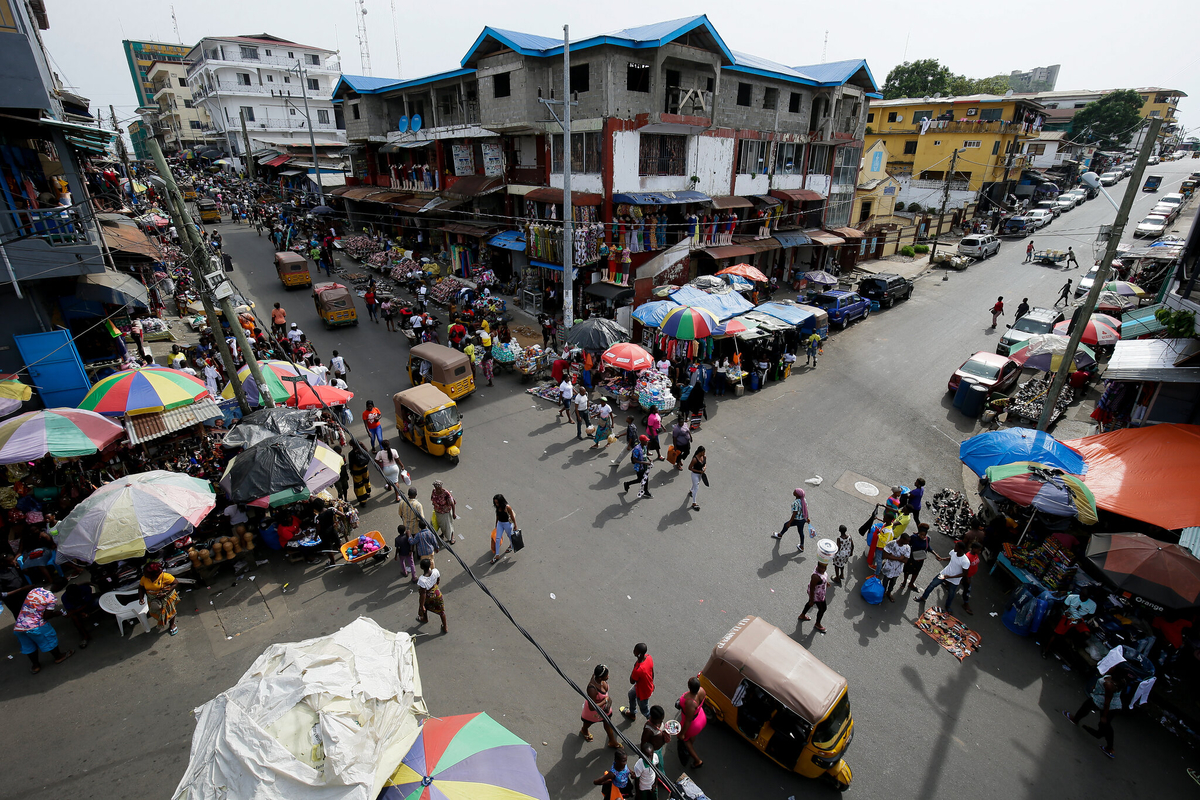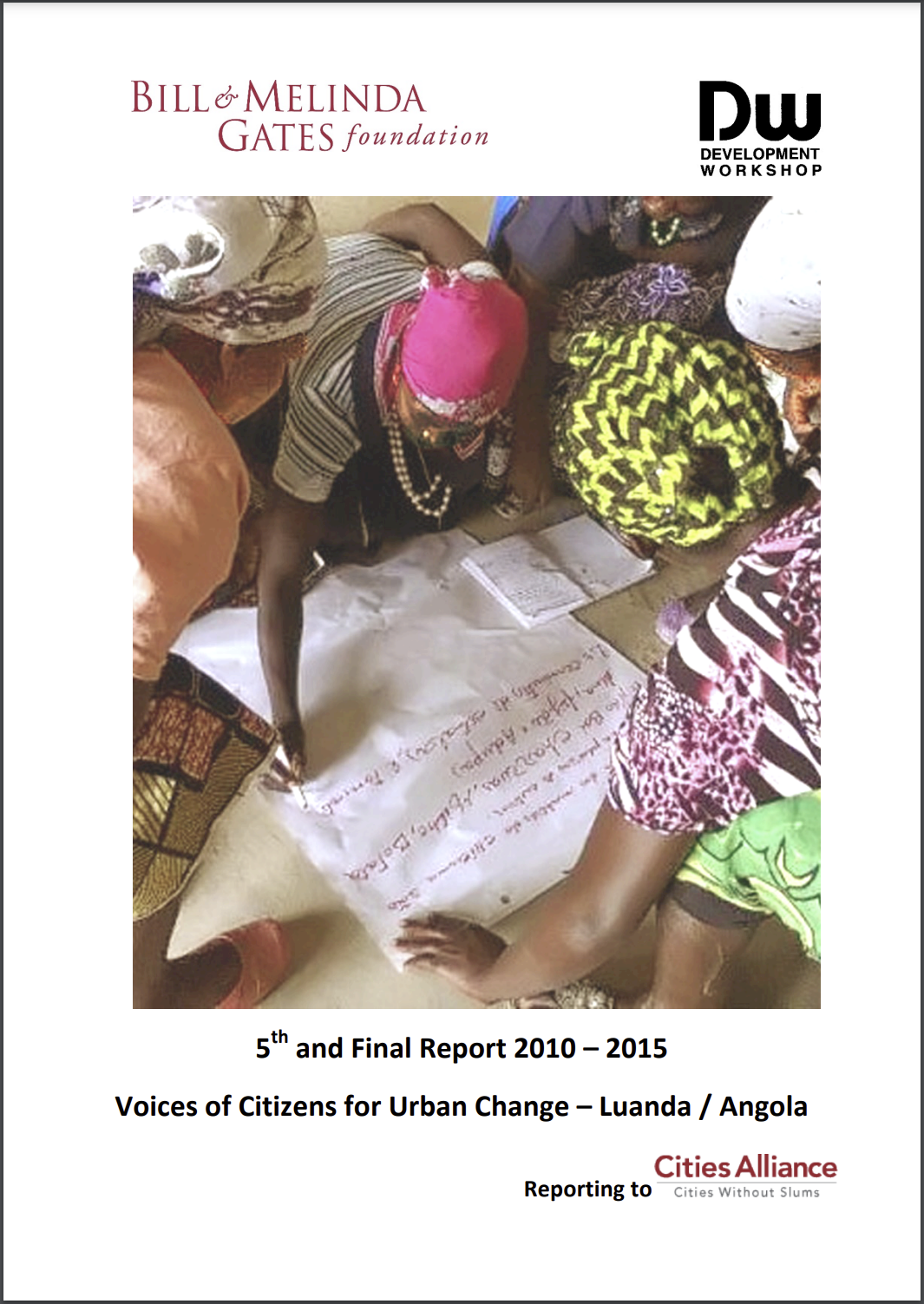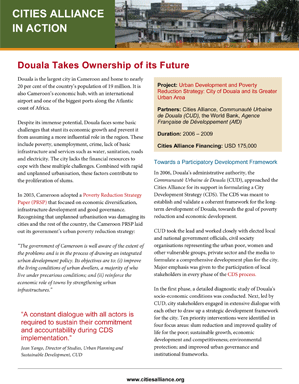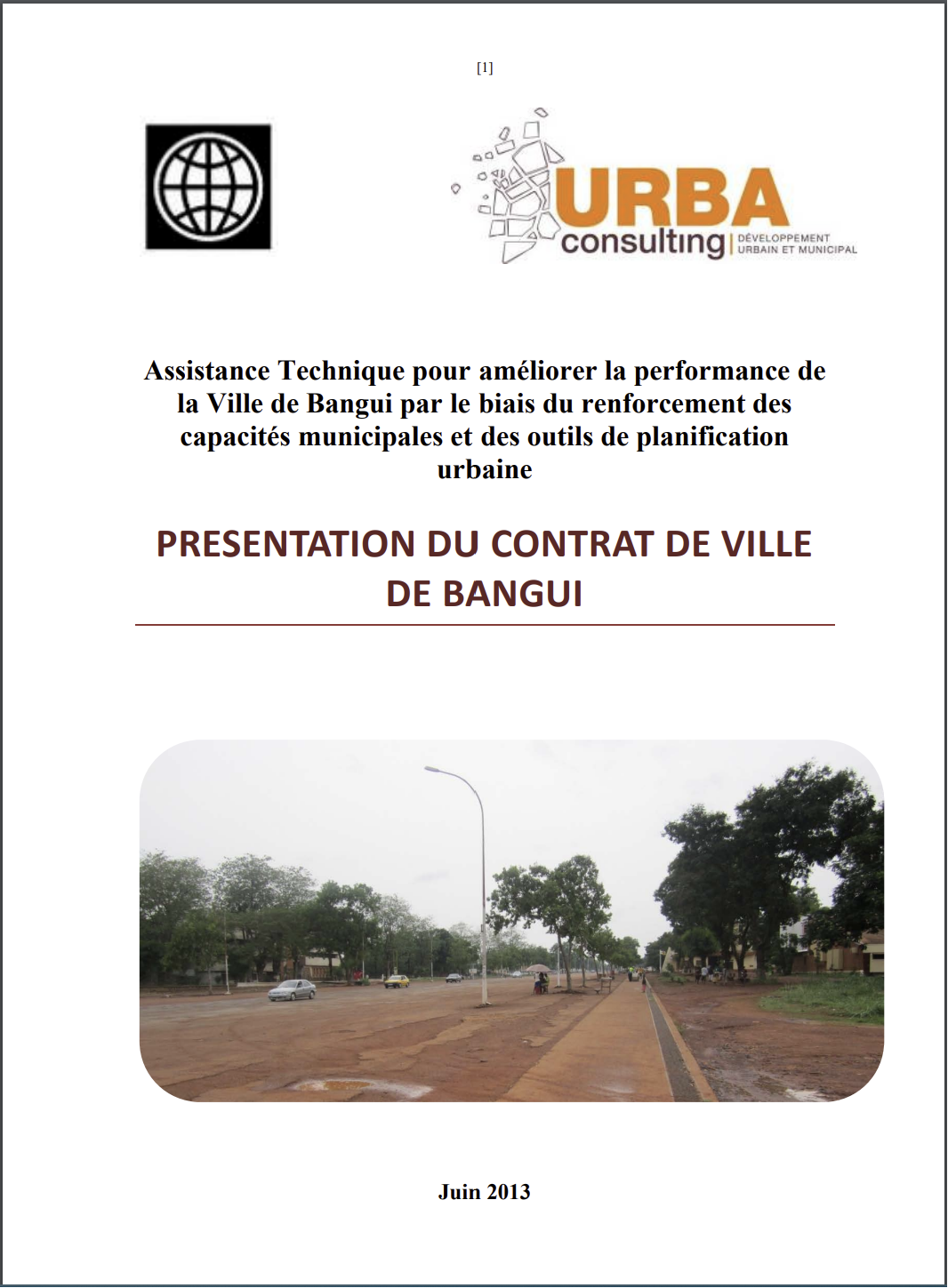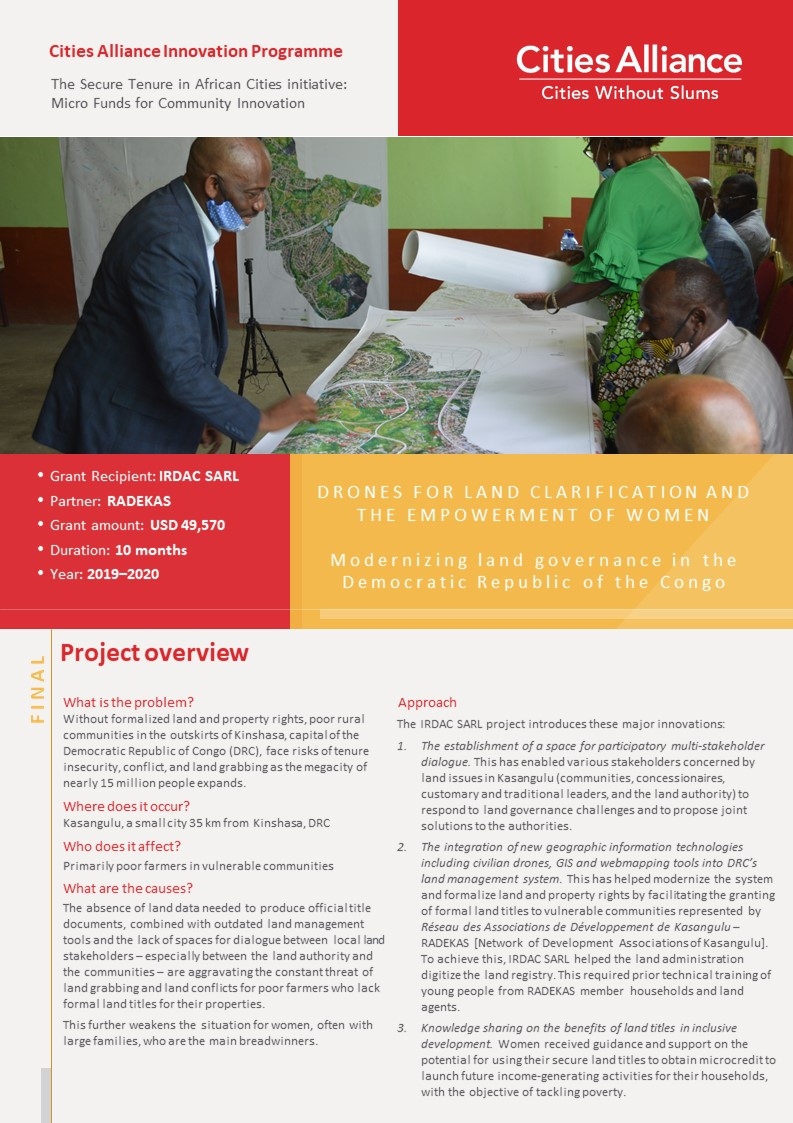In Central Africa, Cities Alliance has supported initiatives including:
- Successfully influencing the adoption of more inclusive public planning processes in Luanda, Angola.
- Developing a city development strategy aimed at poverty reduction and sustainable growth in Douala, Cameroon.
- Building the capacity of Bangui municipality in the Central African Republic (CAR) to manage its development and improve public service provision.
- Improving the social and economic integration of youth in poor neighbourhoods of N’Djamena, Chad.
- Using digital tools and participatory processes to help vulnerable communities formalise and protect their land and property rights in the Democratic Republic of the Congo (DRC).
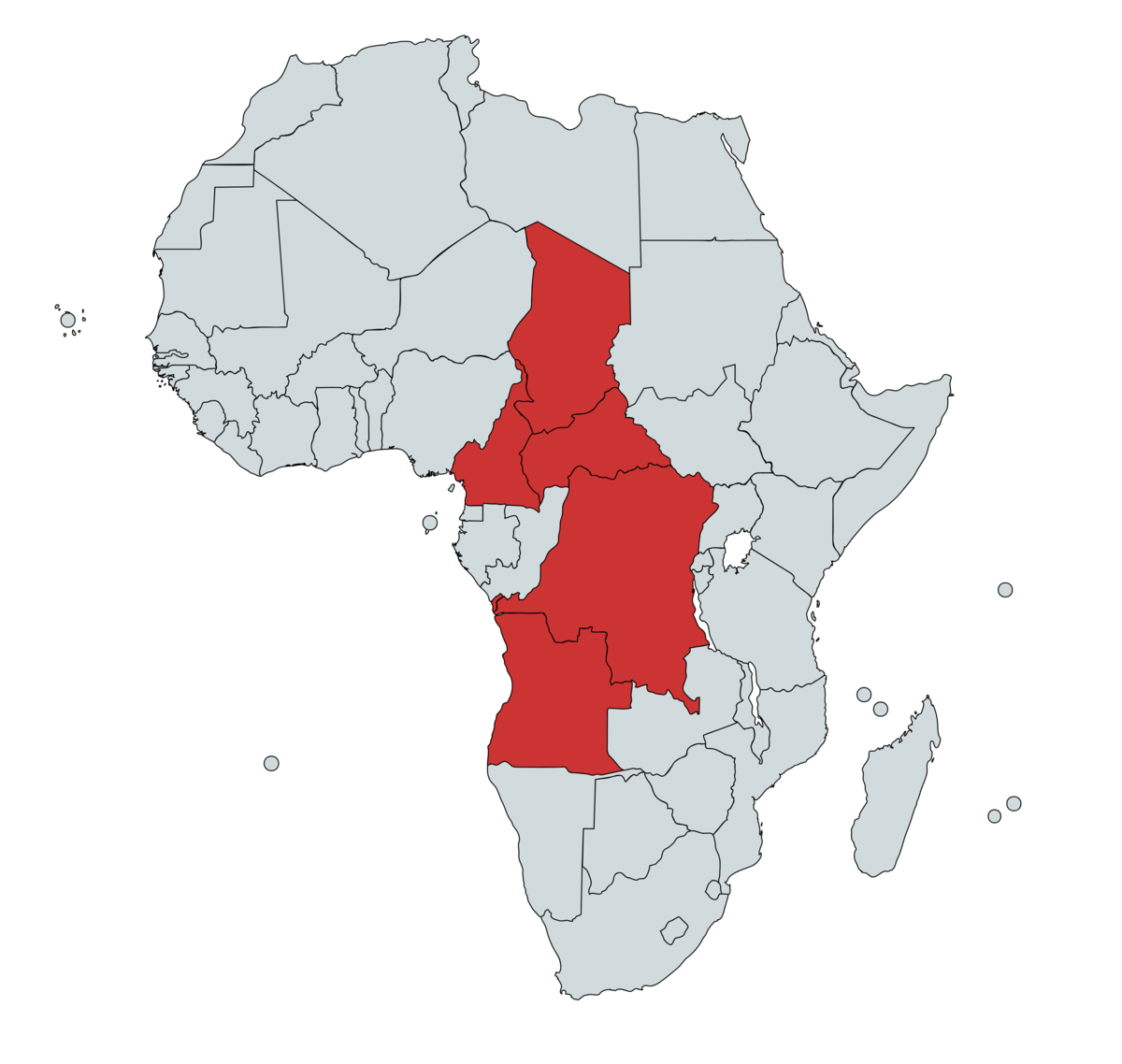
The Voices of Citizens for Urban Change Programme (2010–2015) supported the Angola-based NGO Development Workshop (DW) to successfully influence the adoption of more inclusive public planning processes in Luanda that focused on equity and quality in basic service provision for the poor.
The project, funded by the Bill & Melinda Gates Foundation, had three components:
- Community-driven monitoring of progress towards the Millennium Development Goals through various urban poverty indicators
- Establishing a coalition of groups to advocate for equitable access to basic services
- Increasing access to potable water through community management models of water service delivery
It achieved several significant successes and some positive developments in the cooperation with the local government structures. It improved cooperation between DW and the Ministries of Urbanism and MAT (Administration and Territory), which opened up new levels of engagement between the Government of Angola (GoA) and DW and partner CSOs, leading to positive actions to improve living conditions in the slums (musseques) of Luanda.
Other results included:
- The completion of the Angola 2014 Census (with willing participation from residents of the informal settlements)
- Regular municipal forums that include civil society and feed their recommendations into annual plans and budget consultations
- A manual on community water management that is now the Angolan national policy on sustainable water management; DW works with the government to implement it in municipalities across the country.
- Significant improvements to water coverage in urban settlements
- A greatly improved online presence allowed DW to significantly expand its reach.
The project also included the African–China Urban Initiative to promote collaboration between African and Chinese academic and research institutions, non-governmental organizations (NGOs), and urban development practitioners.
Overall, the project demonstrated the importance of partnerships with relationships at all levels of government and the power of communities to influence policy if they have hard data collected by explainable methodologies and presented on visible maps.
Douala, an economic centre and the fourth largest port on Africa’s Atlantic coast, generates 25% of Cameroon’s GDP. Despite these endowments, the city faces development challenges including a lack of infrastructure, inadequate low-cost housing that causes slums to proliferate, weak municipal institutions, inadequate financial resources, poverty, and unemployment.
This project supported Douala in developing a city development strategy aimed at poverty reduction and sustainable growth and development, creating the conditions for metropolitan Douala to become a regional economic hub capable of attracting investors and promoting new activities. It was implemented by the Communauté Urbaine de Douala (CUD) and the World Bank.
Results
The Douala CDS is credited for its role in nurturing effective partnerships at the city level. CUD led the CDS with minimal assistance from external partners such as the Cities Alliance. It launched an extensive advocacy and outreach campaign to include as many as stakeholders in identifying the needs and priorities of the city.
Several workshops were held in which local participants – including NGOs representing the poor, women and other vulnerable groups – were encouraged to voice their concerns. As a result of this effort, the Douala CDS is seen as a credible and representative development action plan for the city. The participatory and collaborative nature of the CDS process also influenced institutional behaviour and produced new management capacities at CUD and other local institutions.
Based on consultations with different city stakeholders, CUD has now adopted an integrated urban planning approach. This also helped in the prioritisation of projects, since decisions were based on their level of urgency and available resources. As the CDS progressed, CUD and other local actors developed a sense of ownership and commitment to its process and outcomes.
Another major contribution of the Douala CDS is that it has led to critical financing opportunities for the city. In 2011, the World Bank approved a US$28.5 million loan for a city sanitation project. The French development agency AFD also financed a EUR 163 million project (approximately US$212 million) to improve the city’s drainage system. In a country with little public funding for sanitation, this is significant. It also keeps the momentum going for the CDS so that it does not remain a purely academic exercise and translates into action.
The Central African Republic is a landlocked country with an estimated population of 4,407,000 inhabitants in 2008, with a population growth rate of 2.5%. The population is very young, with 49.4% of Central Africans aged below 18.
The level of urban amenities in the capital, Bangui, is very low and its urban management is handicapped by the lack of vertical coordination (between government, the city council, districts and neighbourhood heads), horizontal coordination (between the municipalities of metropolitan Bangui) and inter-sectoral coordination (between the different ministries involved).
This project (2011–2013) built the capacity of the Bangui municipality to ensure sustainable management of its development and efficient and sustainable supply of public services to its residents, thereby maintaining urban hygiene and sanitation.
It also developed a city contract designed to clarify roles and responsibilities between the municipal and central levels of government vis-a-vis infrastructure maintenance and development.
The municipality of Bangui developed a Priority Maintenance Programme that considers available financial resources and revenues, and its administrative and financial management capacity has been enhanced.
The project was implemented by the World Bank.
This project (2013–2015) improved the social and economic integration of youth in four poor neighbourhoods of N’Djamena with socio-educational training, professional integration, and capacity building schemes.
It established employment training offices for youths in the neighbourhoods of Walia, Dembé, Chagoua and N’djari; developed training modules youth and counselors; and undertook activities designed to promote social integration.
Results included:
- Four employment training offices were set up and operationalised in the neighbourhoods, facilitating youths’ access to information, advisory services, and training courses.
- 895 youths were identified and selected following door-to-door visits. 714 attended training, including 20 vocational training courses.
- 39 youths received training and financial support to prepare or access job opportunities.
- 160 health, culture, and integration activities were carried out in four youth centres in the heart of the four neighbourhoods.
The project was funded through the Cities Alliance Innovation Fund’s 2012 Call for Proposals on Youth and the City and implemented by the NGO ESSOR, with support from the EU and AFD.
In Kasangulu, a small city of about 28,000 people in the outskirts of Kinshasa, the Drones for Land Clarification and the Empowerment of Women project demonstrated how digital tools and participatory processes can help vulnerable communities formalise and protect their land and property rights, while reducing potential conflicts and modernising land governance systems.
This was a pilot initiative conducted by IRDAC SARL, a local cartography group, with support from the Cities Alliance Innovation Programme as part of its 2019 call for proposals with the theme Secure Tenure in African Cities: Micro Funds for Community Innovation.
The project was implemented in partnership with members of RADEKAS, a network of community-based development associations in Kasangulu. Despite its proximity to Kinshasa – a megacity of nearly 15 million people – Kasangulu is an agricultural community made up of mostly poor farmers. Many residents are women who are the main breadwinners for their large families. Land pressure in Kasangulu and other rural communities has been intensifying as the fast-growing capital of DRC expands.
Most residents of Kasangulu lack official property titles for their customary lands, a common situation in areas where less formal recordkeeping practices were used in the past. Many people are also unaware of the tenure insecurity risks they face without official title deeds. This leaves them especially vulnerable to conflicts and even the loss of their lands through land grabbing. At the same time, the DRC land registry systems have not been updated with the technology, tools, and data needed to clarify land ownership claims and issue official title documents.
The IRDAC pilot project helped the DRC land administration modernise its land management tools and establish a digital, automated cadastral database for Kasangulu. To do this, the pilot project trained a team of 31 people on how to use drones and topographical surveys to collect data. The participants included 14 young men and women from RADEKAS households, along with district land registry agents, and others.
The project team accomplished the following:
- Created a complete land registry plan covering 622,000 ha in the Kasangulu districts of Ngambi, Luzamba, Manoka and Mvula Nene
- Extracted nearly 5,000 land plots from the drone’s aerial digital images
- Measured and demarcated a sample of 98 plots belonging to RADEKAS members on the registry plan
- Implemented a customised IRDAC smart filter app that extracts individual land data from the land registry database to be used for producing official land titles.
The new technologies, tools, and methods streamlined the process for gathering land information.

